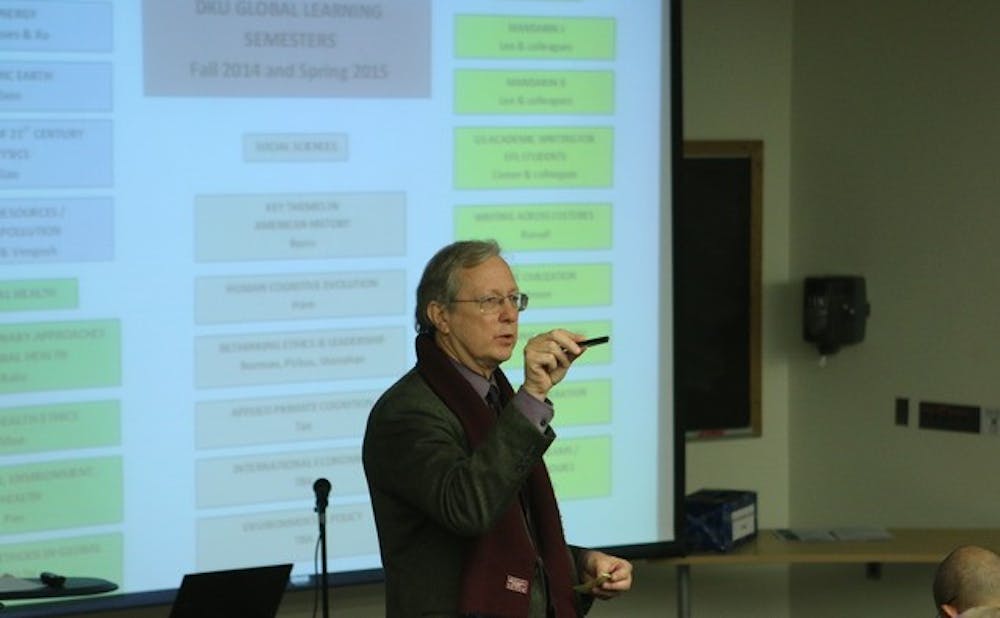A new certificate program focusing on civic engagement is working its way toward approval.
The proposal for the Civic Engagement and Social Change certificate was presented at the Arts and Sciences Council meeting Thursday and will require four courses and two thematically related co-curricular experiences. The courses include a gateway class titled “Engaged Citizenship and Social Change," a capstone seminar course titled “Lives of Civic Engagement" and two electives within three core themes. The co-curricular components require students to participate in one 150-hour partnership within the community and one 300-hour partnership.
In past years, Duke has developed more opportunities for students to have structured civic involvement, such as the summer service program DukeEngage, Council Chair Thomas Robisheaux explained. However, he noted that there should be more of an academic component available to students’ civic service involvement.
“One of the faculty concerns…is that the volunteerism among our students is done in kind of a one-off fashion… but there is no integration with the academic portion,” he said. “If it takes place within the university environment, we should have a rigorous academic component.”
The program’s core values center on democracy, citizenship and political participation; civil society and voluntarism; and social change and social movements, according to the presentation given by David Malone, associate professor of the practice in education; Eric Myln, executive director of DukeEngage and assistant vice provost for civic engagement; and Education Department Chair Jan Rigsbee.
The certificate—which was originally proposed to the Curriculum Committee in Fall 2013—will be housed within the Department of Education.
Sherryl Broverman, associate professor of the practice of biology and global health, presented the findings of a report on plagiarism sanctions conducted by the Plagiarism Sanctions Review Committee, chaired by Broverman. The the report found that the Office of Student Conduct and the Undergraduate Conduct board are the most consistent parts in the process of finding students responsible for plagiarism. However, faculty are prone to have variable outcomes especially regarding grade sanctions.
The report also found that students cheat for a variety of reasons but failing grades do not appear to be the primary motive. It recommended that the Office of Student Conduct and Undergraduate Conduct Board become more aware of factors such as background, social networks, upbringing and cultural capital that could influence a student's demeanor during the disciplinary process.
Broverman noted that faculty should strive toward achieving more consistency in their grading policies concerning plagiarism, and for the University as a whole to be more transparent about policies in order to change the culture surrounding academic integrity.
“We as a faculty need to discuss cultural issues,” Malone said during a discussion about the report. “It’s so high stakes and so competitive that it creates an environment in which we’ve moved away from seeing the purpose here of being a community of learning and more toward individual attainment.”
In other business:
Robisheaux noted that the Duke Kunshan University joint committee recently held a meeting in which they reviewed 10 undergraduate courses for DKU and approved eight of them, across a variety of subjects from physics to global health. The two that were not approved will continue to be reviewed, including clarifying what level the courses will be offered on.
Alex Hartemink, Alexander F. Hehmeyer associate professor of computer science, noted that the next Arts and Sciences Council meeting will allow a block of time for conversation to discuss the University’s strategic plan and asked that the council consider some major directions that the University could potentially take in the planning stages.
“What are some things that Duke ought to be thinking about in the next 10 years as it lays down its strategic plans?” Hartemink prompted the council.
Sociology professor Linda George explained the process for upcoming Arts and Science Council elections. Members whose two-year term is expiring will need to inform their department chair and put in motion a selection process for that department’s next representative.
Additionally, elections will be held within the council to replace any vacancies on the Arts and Sciences executive council. An faculty-wide election will take place later this year to fill the chair vacated by Robisheaux, whose term is ending.
Correction: This article previously noted that the plagiarism report recommends the Office of Student Conduct to be more aware of factors that could influence cheating, whereas the factors are what could influence students' actions during the disciplinary process. The Chronicle regrets the error.
Get The Chronicle straight to your inbox
Signup for our weekly newsletter. Cancel at any time.

